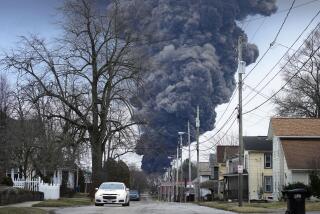EPA Report Declares Dioxin a Cancer-Causing Agent
- Share via
WASHINGTON — The long-expected government announcement Monday that the chemical dioxin causes cancer--and that the risk is greater than originally believed--has set off a new debate: what to do about it?
The Environmental Protection Agency declared for the first time Monday that dioxin is a carcinogen, and said that the vast majority of exposure to the chemical comes from the food Americans eat--a connection that likely will prompt further concerns about the safety of the U.S. food supply.
Dioxin comes from both natural and industrial sources, primarily waste incineration and the production of plastics and paper pulp. It can contaminate soil and water and enter the food supply from fish in tainted water and animals that eat plants containing the chemical.
It accumulates in the fat of fish and animals and has been associated with several human lymphomas and lung cancer. It also can be passed through the breast milk of nursing mothers.
In its report, the EPA said the chemical “can alter the fundamental growth and development of cells,” leading to cancer and reproductive problems in animals “and potentially in people.”
The EPA report, a draft that will undergo further scientific review before being released in final form this fall, also sought to reassure Americans by stressing that dioxin levels in the atmosphere have declined substantially during the last two decades, the result of regulatory and other actions that have reduced dioxin emissions.
The agency said that, based on a more complete understanding of dioxin toxicity, “the risks to people may be somewhat higher than previously believed, even though actual exposure seems to be declining among the general population.”
The conclusions about the chemical’s cancer-causing properties came as no surprise. Dioxin has long been associated with cancer and other health consequences, such as birth defects.
Dioxin first came to widespread public attention as a contaminant in the herbicide Agent Orange--used by American forces during the Vietnam War to defoliate enemy hiding places--after Vietnam veterans began complaining of a range of health problems, from skin rashes to cancer and birth defects in their offspring.
Also, in 1983, the EPA essentially demolished the entire town of Times Beach, Mo., after substantial dioxin contamination was discovered on city streets.
A fact sheet issued by the Public Health Service, the Agriculture Department and the EPA emphasized that the agencies have been monitoring dioxin levels in food for many years and will continue to do so. Furthermore, it said, Americans should follow the U.S. dietary guidelines which, among other things, urge a reduction in fat consumption.
It also said that it was safe to continue to breast feed, saying that “dioxin has been in breast milk for many years and breast-fed infants show no increase in the number of cases of childhood cancer.”
It also declared that the U.S. food supply is “among the safest and most nutritious in the world,” adding: “Food will never be without some risk and we are constantly working to reduce those risks.”
The EPA report issued no new dietary recommendations. But it did draw a direct link between fatty foods and dioxin residues, prompting criticism from both environmental and industry groups.
“A lot of people eat a fatty diet, and EPA is insinuating that Americans should cut back on fat,” said Monica Rhode, an official with the Falls Church, Va.-based Center for Health, Environment and Justice, a grass-roots environmental group founded in the wake of the Love Canal toxic dump crisis. “This should not be about a fat-free diet for Americans but a dioxin-free diet for polluters.”
And at least one restaurant industry group complained that the publicity almost certainly would provoke a consumer backlash in dining out.
“The EPA says that dioxin is found in beef, fish and poultry--all the wonderful things that Americans like to eat--and that our members are in business to sell,” said Scott Wexler, of the Empire State Restaurant Assn., which represents 5,000 restaurant and tavern owners in New York state.
“Americans are very health-conscious and our members are very fearful that, if Americans react the same way that Europeans reacted, it would cause serious economic strife for American restaurant owners,” he said.
A year ago, several European countries--including Belgium, Germany, France and the Netherlands--took a series of actions after reports that dioxin had contaminated the food supply through tainted animal feed.
Belgium banned chickens and egg-based foods from hundreds of farms and took butter off store shelves, while French agriculture officials stopped chicken production on dozens of French farms.
The New York restaurant group has filed a lawsuit in federal district court here seeking to block the release of the final report “based on the fact that they haven’t proven the case that the potential risk of dioxin is outweighed by the economic damage it would cause,” Wexler said.
Meanwhile, dozens of environmental groups sent a letter to President Clinton and Vice President Al Gore Monday urging the administration to further regulate industrial sources of dioxin pollution.
But Kip Howlett, executive director of the Arlington, Va.-based Chlorine Chemistry Council, said the industry has cooperated with EPA actions in the past to reduce levels of dioxin, “and will continue to do so,” adding: “We do not have a public health crisis or emergency here.”
More to Read
Sign up for Essential California
The most important California stories and recommendations in your inbox every morning.
You may occasionally receive promotional content from the Los Angeles Times.













